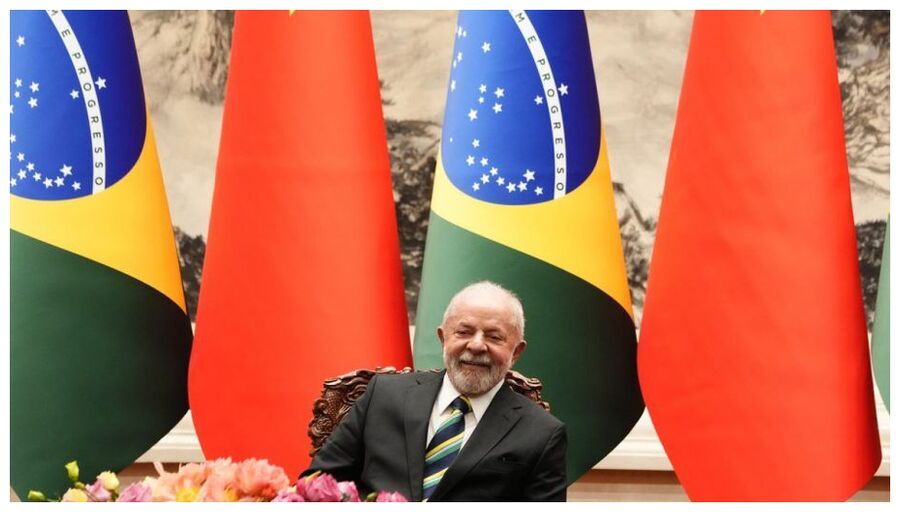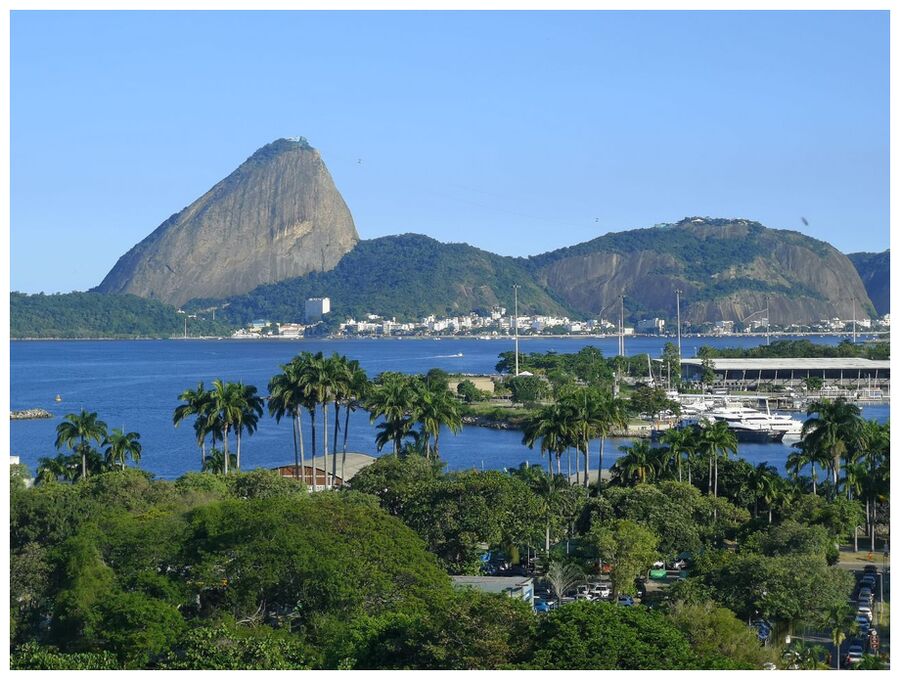
© Strategic Culture Foundation
I have just been immersed in an extraordinary experience: a mini-tour of conferences in Brazil encompassing four key cities - Sao Paulo,
Rio, Salvador, Belo Horizonte. Full houses, sharp questions, fabulously warm people, divine gastronomy - a deep dive into the 8th largest economy in the world and major BRICS+ node.
As much as I was trying to impress the finer points of the long and winding road to multipolarity and the multiple instances of frontal clash between NATOstan and the Global Majority, I was learning non-stop from an array of generous Brazilians about the current inner contradictions of a society of astonishing complexity.

© Strategic Culture Foundation
It's as if I was immersed in a psychedelic journey conducted by
Os Mutantes, the iconic trio of the late 1960s Tropicalia movement: from the business front in Sao Paulo - with its world-class restaurants and frantic deal-making - to the blinding beauty of Rio; from Salvador - the capital of Brazilian Africa - to Belo Horizonte, the capital of the third-wealthiest state in the Federation, Minas Gerais, a powerhouse of iron ore, uranium and niobium exports.
Chancay-ShanghaiI learned about how China chose the state of Bahia as arguably its key node in Brazil, where Chinese investment is everywhere - even if Brazil is not yet a formal member of the Belt and Road Initiative (BRI).
In Rio, I was presented with an astonishing work on Stoics Zeno and Cleanthes by essayist Ciro Moroni - delving among other issues into the equivalences between Stoic theogony/theology and the Hindu Vedanta - the tradition of culture, religion and sacred rituals in India up to the Buddha era.
And in a sort of psychedelic synchronicity, I felt like Zeno in the Agora as we debated the NATO proxy war against Russia in Ukraine at a lovely round pavillion - a mini-Agora - in fabled Liberty Square in Belo Horizonte, across the street from a fabulous exhibition of Treasures of Peruvian Art.
Much to my astonishment, a Peruvian, Carlos Ledesma, flew in from Lima especially for my conference and the exhibition; and then he told me about the Chancay port being built south of Lima, owned 70% by COSCO and the rest by private Peruvian capital; that will be a sister port of Shanghai.
Chancay-Shanghai: APEC in action across the Pacific.
Next November, there will be three nearly simultaneous key events in South America: the G20 in Rio, the APEC summit in Lima, and the inauguration of Chancay.Chancay will be boosted by no less than five rail corridors that may eventually be built - certainly with Chinese investment - from the agribusiness Valhalla in the Brazilian Center-West all the way to Peru.
Yes, China is all over the place in its largest trade partner in Latin America - much to the despair of a Hegemon sending lowly functionary Little Blinken to Beijing to hear the letter of the new law by Xi Jinping himself:
it's cooperation or confrontation, a "downward spiral". Your downward spiral.A river from Tibet to XinjiangAt the Belo Horizonte conference, I shared the stage with remarkable Sebastien Kiwonghi Bizaru from Congo, who supervises PhD programs at the Candido Mendes University as well as being a Professor of International Law, after an extraordinary academic journey.
He is also the author of a ground-breaking book examining the highly debatable role of the UNSC in the conflicts of the Great Lakes - focusing on Rwanda, Burundi and the Democratic Republic of Congo.
With top researcher Natacha Rena, we pored over a map of China retracing her travels east to west last year all the way to the Xinjiang border - as she filled me in on the astonishing Honggqi River - or Red Flag River - Project, first proposed in 2017: no less than
an attempt to divert water from Tibet to the dry lands and deserts of Xinjiang by building an enormous, over 6,000 km-long artificial river, including the branch canals.The projected river will be slightly less longer than the Yangtze, diverting 60 billion cubic meters of water a year, more than the annual flow of the Yellow River. Predictably, ecologists in China are attacking the project, which may have already had an official go-ahead and is proceeding discreetly.
And then, as I was on the road between Rio and Minas Gerais, the BRICS 10 Ministers of Economy and heads of Central Banks met in Sao Paulo: and all of them hailed the drive towards "independent" payment settlement mechanisms. Russia is the 2024 president of this crucial group.
Russian Vice-Minister of Finance, Ivan Chebeskov, went straight to the point: "Most countries agree that payment in national currencies is what the BRICS need." The Russian Ministry of Finance privileges the creation of a common digital platform congregating the
BRICS Central Banks' digital currencies and their national systems of transmitting financial messages.
Crucially, at this BRICS 10 meeting, most members stressed they are in favor of totally bypassing the U.S. dollar for trading.
Russian Minister of Finance Anton Siluanov was even bolder: he said that Russia is proposing to BRICS the creation of an independent and "de-politicized" global system of payments.
Siluanov hinted that the system may be based on blockchain - considering its low cost and minimal control exercised by the Hegemon.
BRICS map the new world in Sao PauloA day before the meeting in Sao Paulo, Foreign Minister Sergey Lavrov in Moscow supported the development of these BRICS strategies, noting that "if we manage to develop independent financial mechanisms, that will seriously question the globalization mechanism currently led by the West."
As over 100 nations are currently researching or embryonically implementing a digital currency in their Central Banks, a big breakthrough is imminent in Russia - a process I have been following in detail since last year.
In the end, it's all about Sovereignty. That was the crux of the most serious debates I had this past week in Brazil, with academic players and on several podcasts related to the conferences. It's the overarching theme hanging over the Lula government, as the President seems to cast the figure of a lonely fighter cornered by a vicious circle of 5th columnists and comprador elites.
In Belo Horizonte I was presented with yet another astonishing book by a former, brilliant government official, the late Celso Brant. After a sharp analysis of the modern history of Brazil and its interactions with imperialism, he reminds the reader of what stellar Mexican writer and poet Octavio Paz said in the 1980s about Brazil and China: "These will be the two great protagonists of the 21st century."
When Paz rendered his verdict, every indicator favored Brazil, which since 1870 held the largest GDP growth in the world. Brazil exported more than China, and from 1952 to 1987 was growing at annual rate of 7.4%. Continuing the trend, Brazil would be the 4th largest economy in the world by now (it's between 8th and 9th, side by side with Italy, and could be the 5th, were not for direct destabilization by the Empire starting in the 2010s, culminating with the Car Wash operation).
That's exactly what Brant shows: how the Hegemon intervened to crash Brazilian development - and that started way before Car Wash. Kissinger was already saying in the 1970s that "the United States will not allow the birth of a new Japan under the Equator line."
Hardcore neoliberalism was the privileged tool. While China under Little Helmsman Deng Xiaoping and then Jiang Zemin went Full Sovereign, Brazil was mired in neocolonial dependency. Lula tried - and is now trying it again, against all odds and surrounded on all sides, with Brazil branded as a "swing state" by U.S. Think Tankland and potential victim of new rounds of imperial Hybrid War.
Lula - and some solid academic elites away from power - know full well that as a neo-colony, Brazil will never fulfill its potential of being, side by side with China, as prophesized by Paz, the great protagonist of the 21st century.
That was the major takeaway of my psychedelic tour of Tropicalia: Sovereignty. Viktor Orban - accused by simpletons of being a member of a fuzz "Neofascist International" -
nailed it with a simole formulation: "The inglorious period of Western civilization will be brought to an end this year, by replacing the world built on progressive-liberal hegemony with a Sovereigntist one."
Reader Comments
to our Newsletter